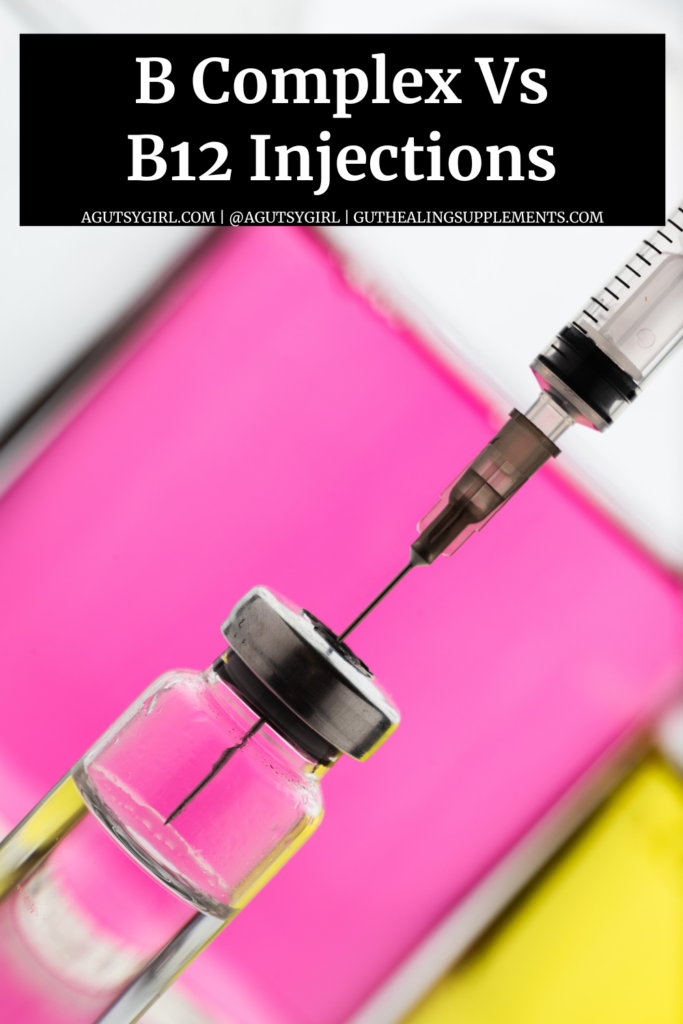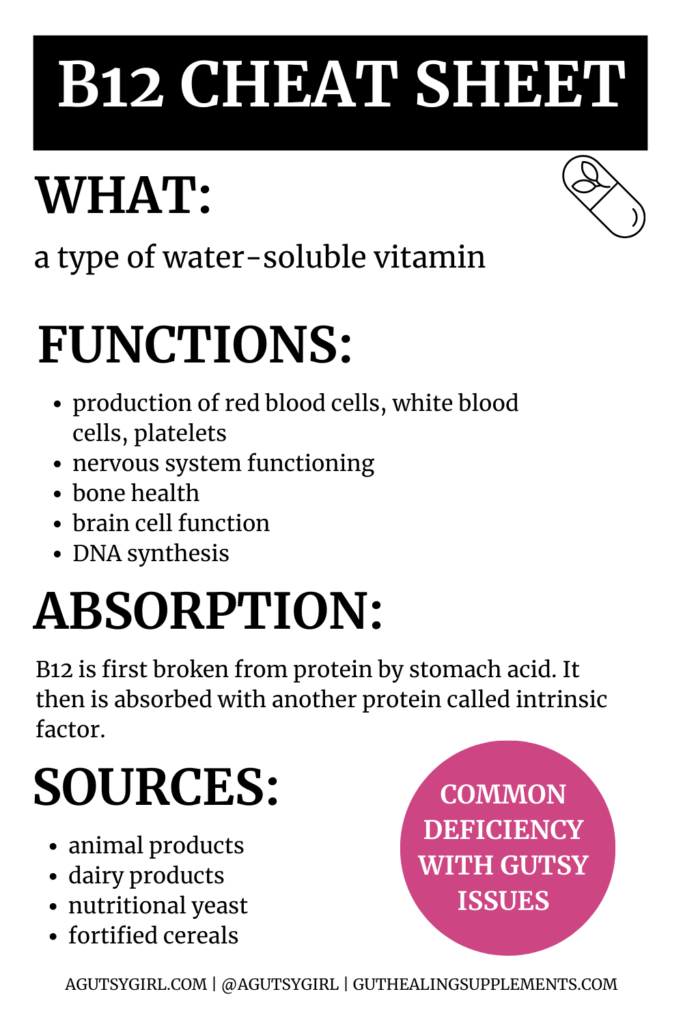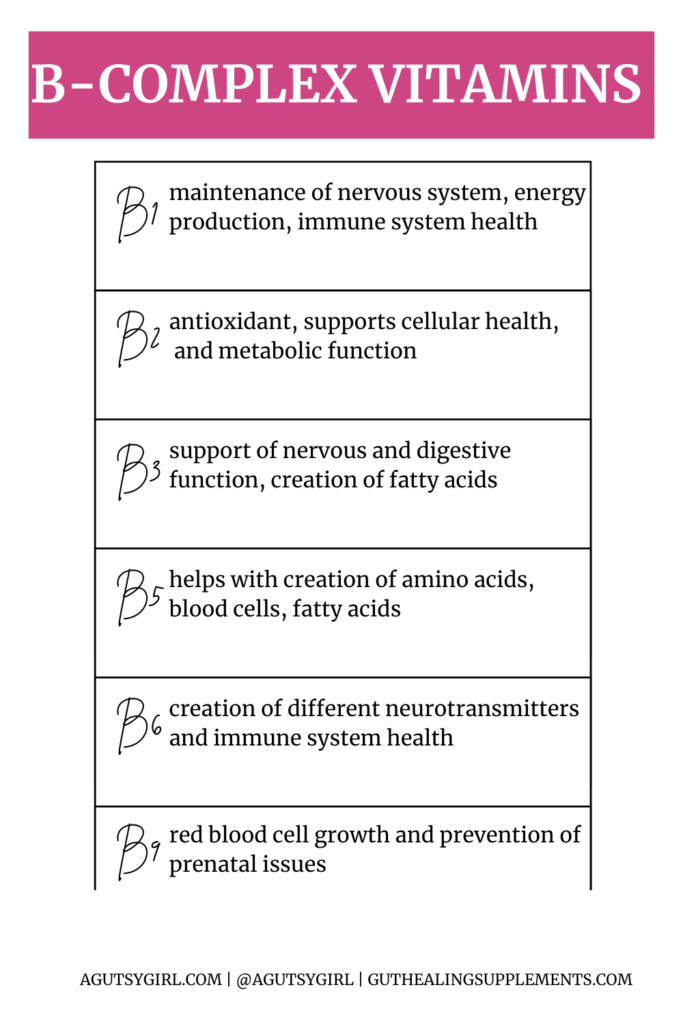What is the difference between a B Complex vs B12 injections?
This is a topic that might be top-of-mind if you have SIBO (small intestinal bacterial overgrowth) and/or anything else that is depleting those essential B vitamins.
And, in fact, you might even be curious about all of this if you have been hearing about the world of IV therapy and injections.
This sector of the holistic health world has become huge and has often been touted for its many benefits for whole-body health.
So just what are injections and how do these support your health?
We will get into all of that and more today. Let’s get started.
B Complex Vs B12 Injections
Click HERE to save this post for later.

What are Injections?
Injections are another word for shots.
These often are intramuscular injections, which means that the needle targets muscle tissue and releases its contents there.
Muscle tissue also is highly vascularized, which means it contains a lot of blood vessels and allows for the medication to travel into the bloodstream quickly. This allows for easy absorption into the rest of the body.
Some common uses for injections include:
- vaccines
- antibiotics
- corticosteroid hormones to calm down inflammation
- hormonal therapy
Other Uses for Injections
Another common use of injections is for people, such as Gutsy girls, who have a hard time absorbing micronutrients.
Vitamins and minerals such as vitamin C and vitamin B are commonly administered through injections to correct deficiencies.
Since the shot does not have to travel through the digestive tract, this allows for the micronutrients to be fully absorbed by your body.
It is a great option (and alternative to oral supplements) for anyone who has any sort of gut issue in which absorption is impaired. i.e. SIBO
Vitamin B12 Injections
One of the most popular micronutrient injections is B12 injections.
This is a type of water-soluble B vitamin that is responsible for the production of red blood cells that support your ability to uptake oxygen as well as support the function of your immune system.
Vitamin B-12 helps synthesize:
- white blood cells- responsible for fighting infection and make up part of the immune system
- red blood cells- carry oxygen throughout the body
- platelets- help to clot injury
B12 also is responsible for nervous system functioning, bone health, and the function of brain cells.
It plays an extremely important role in brain function, especially when it comes to the regulation of mood. It is also critical for DNA synthesis, which creates the blueprint for all our genes.
B12 is mostly found in animal sources, leading to vegetarians and vegans often falling short in their levels.
The B12 injection is administered every week or every few weeks for optimal results.
It is completely absorbed by the bloodstream, which makes it much more efficient at correcting nutritional deficiencies.

Vitamin B12 Absorption
The absorption of vitamin B12 is slightly more complicated than other vitamins due to its dependence on a protein called intrinsic factor.
B12 is first broken down by stomach acid. This helps to detach B12 from the proteins that it is originally attached to.
This first step is already a problem for many Gutsy girls.
Low stomach acid is a root cause of a lot of GI issues, which means that the stomach can not create enough acid to properly unwind proteins.
This results in impaired B12 absorption, due to an inability to properly isolate B12.
The next step of B12 absorption occurs when the B12 combines with the protein intrinsic factor.
The production of intrinsic factor happens in the stomach, which if impaired, can have a hard time properly synthesizing this protein.
Since B12 and intrinsic factor HAVE to be absorbed together this can make for a difficult situation.
For this reason up to 40% of adults fail to properly absorb B12.
Some high risk groups for vitamin B12 deficiency include:
- elderly people- often stomach acid production decreases with age
- individuals who have had intestinal surgery such as weight loss surgery or laparoscopies
- individuals with GI issues including celiac disease, IBD, IBS (MOST OF YOU!!!)
- those following a vegetarian or vegan diet- due to the lack of animal protein eaten (one of the main sources of B12)
- individuals with pernicious anemia- do not make intrinsic factor
Notice how a fair amount of the high risk individuals are those with some sort of intestinal issue.
That means if you have Gutsy issues you also have a high risk of deficiency.
Source: HERE
B12 Deficiency Signs
Some warning signs that you have low levels of B12 include:
- chronic fatigue
- confusion and brain fog
- headaches
- pale skin
- swelling
- memory loss
As with most micronutrients, I recommend getting a blood test before doing any sort of supplementation or injection.
This can prevent the adverse effects that may come if you have no deficiency to correct.
B12 Sources
If you are looking to get more B12 through dietary sources, there are a couple of good options.
B12 is found in most animal products including fish, meat, poultry, eggs, and beef. Dairy products also contain a high amount of B12, which can be a good option for vegetarians.
If you are vegan look to some breakfast cereals, as they are often fortified with B12 vitamins. Nutritional yeast also contains significant levels of B12, which can easily be added to most meals.
B-Complex Injections
Another option is a vitamin B complex injection, which is a blend of several different B vitamins.
They often include thiamine (B1), riboflavin (B2), niacinamide (B3), and others.
Vitamin B complexes are great for anyone who has several different B deficiencies.
They are directly involved with the functioning of the nervous system, energy production, and the synthesis of different signaling molecules.
Some of the individual functions of B-complex vitamins include:
- B1- maintenance of nervous system function, energy production, and immune system health
- B2- antioxidant, health of cells, and metabolism function
- B3- support of nervous system and digestive system, helps with creation of fatty acids
- B5- helps with creation of amino acids, blood cells, fatty acids
- B6- creation of different neurotransmitters and immune system health
- B9- helps with prenatal development and red blood cell growth
As you can see, essential B vitamins are absolutely integral to the health of the digestive and nervous system, which can often make them a great choice for people struggling with digestive issues.
Source: HERE

Symptoms of Vitamin B Deficiency
While some of the symptoms of B12 and vitamin B are going to overlap, there are some signs that you may be deficient in more than just one of these vitamins.
B6
This deficiency is not very common in the United States, but it is still important to note the symptoms.
Some of the common signs include:
- confusion
- nausea
- anemia
- skin rashes and flare-ups
- decreased immune function
B1 and B2
Both of these deficiencies are very rare in the United States, as many foods contain these vitamins in fairly high amounts.
Some of the signs include:
- confusion
- cracked mouth
B3
This deficiency is also incredibly rare in the United States.
Signs include:
- constipation/ diarrhea
- fatigue
- hallucinations
- red tongue
- rough skin
Since B3 is so integral to the health of the digestive system, a lot of the symptoms revolve around the intestines.
Do NOT mistake these symptoms for some other root cause such as SIBO, parasites, or bacterial overgrowth.
This is part of the reason it is so so important to get tested for micronutrient deficiencies.
B9
This deficiency is slightly more common.
Signs include:
- headache
- heart palpitations
- shortness of breath
- brain fog
- chronic fatigue
- inability to concentrate
- weakness
Source: HERE
Are Injections Necessary?
Maybe and maybe not; it all depends on you as an individual based on current circumstances, diagnosis, and testing results.
In my opinion there is typically no need for B complex injections.
These vitamins can easily be consumed through food or other supplementation.
However, if you are having long term struggles with absorbing B vitamins, then an injection could be a good last resort option.
However, I do think B12 injections are much more useful, as this vitamin requires several more steps to absorption.
It is found in less food sources and can become a common issue, especially for those who do not eat animal meat.
It can be easily absorbed into the bloodstream by injections, which can help prevent chronic neurological and cellular damage.
Other Options to Ensure Enough Vitamin B
If you are not a big fan of needles or want to try other methods first, you can always try a dietary supplement.
They make both B complex and B12 vitamin supplements, which can be a good starting point.
Sometimes an oral vitamin can further upset the stomach, so be aware that this is a possible side effect.
In order to prevent possible deficiencies try to eat as varied of a diet as possible. This should ideally consist of a diverse range of meats, grains, fruits, and vegetables.
Since B is an essential vitamin, it does have to be taken in from outside sources. The body can not synthesize this vitamin on its own, so you must take steps to ensure you do not become deficient.
I hope that you have a better understanding of B vitamins and the different methods of correcting a deficiency.
Comment down below your own experience with micronutrient deficiency and if you have tried any of these methods.
If you liked this post, you might also enjoy:
Xox,
SKH
Janie Greene is



![Can Constipation Cause Back Pain [+ 5 other things you didn’t know constipation can cause]](https://agutsygirl.com/wp-content/uploads/2021/06/constipation-featured-agutsygirl.com_.png)



Very useful information! Thanks!
Most welcome.